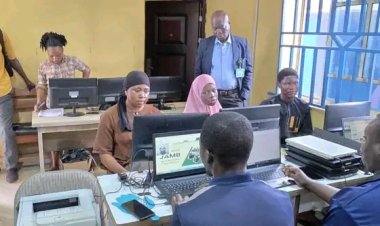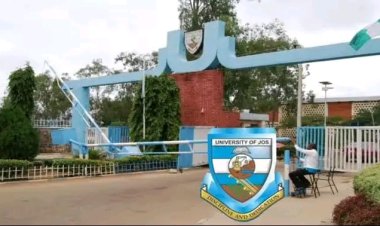IGP Highlights Achievements in Combating Security Challenges in Nigeria During Lecture at UI
Inspector General of Police Dr. Kayode A. Egbetokun delivered a lecture at the University of Ibadan, highlighting the Nigerian Police Force's achievements in managing internal security challenges.

Dr. Kayode A. Egbetokun, the Inspector General of Police (IGP) of the Federal Republic of Nigeria, delivered a significant lecture on the Nigerian Police Force’s (NPF) efforts and achievements in managing internal security challenges. This lecture, held at the University of Ibadan’s TETFUND Centre of Excellence in Multidisciplinary Studies, was the first Distinguished Personality Lecture at the institution.
RECOMMENDED: UI Students Accuse Institution of Victimization After Fee Hike Protest
In his lecture titled "The Nigerian Police Force and the Management of Internal Security," Dr. Egbetokun emphasized the profound impact of internal security challenges on Nigeria, including human rights violations, socioeconomic disruption, political instability, displacement, and economic losses. He underscored the need for comprehensive strategies focusing on peace building, conflict resolution, humanitarian assistance, and sustainable development to address these issues effectively.
Since assuming leadership, Dr. Egbetokun noted that the NPF has adopted three strategic policing methods: confrontation, suppression, and accommodation. He highlighted that his tenure has particularly focused on the accommodating policing model, aligning with global standards of democratic policing. This approach has involved close collaboration with the military and other security agencies to tackle various security challenges, such as terrorism, insurgency, and communal violence.
Despite the persistent challenges and implementation gaps, the IGP outlined several notable achievements of the NPF. These include successful operations against terrorism, armed robbery, and kidnapping, which have significantly improved community safety. The NPF has also advanced in adopting modern technology and intelligence-gathering techniques, enhancing their responsiveness to security threats. Additionally, community policing initiatives have fostered better cooperation between the police and local communities, building trust and collaboration.
SEE MORE: UI Wins Grand Prizes at Huawei ICT Competition
Dr. Egbetokun urged the Nigerian government to maintain its commitment to ongoing reforms within the NPF, ensuring adequate budgetary support for equipment, infrastructure, and training programs. He also recommended expanding community policing initiatives across all states and conducting public awareness campaigns to educate citizens on their rights and responsibilities. Furthermore, he called for decisive action to combat corruption and impunity within the NPF to strengthen Nigeria’s internal security apparatus.
The Vice-Chancellor of the University of Ibadan, Professor Kayode O. Adebowale, praised Dr. Egbetokun’s contributions, noting the university’s careful selection of speakers for public lectures. He highlighted the importance of the NPF in managing internal security and expressed confidence in Dr. Egbetokun's insights on the subject.
The Acting Director of the TETFUND Centre of Excellence in Multidisciplinary Studies, Dr. Benjamin A. Aluko, explained that the Centre aims to expand knowledge in early warning systems and security management to promote sustainable peace and development in Nigeria and Africa. Following the lecture, the official opening of the Professor Isaac Olawale Albert Library at the Department of Peace, Security and Humanitarian Studies was conducted.

 Chris Oyeoku Okafor
Chris Oyeoku Okafor 



